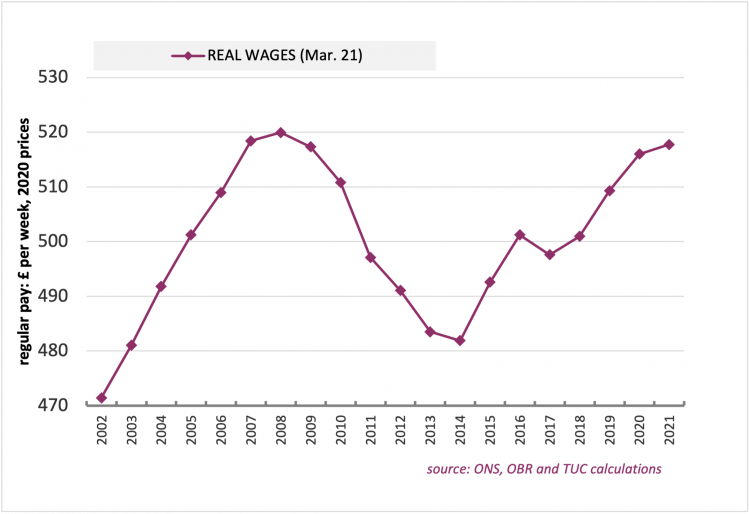A minimum wage rise isn’t enough to secure decent pay across the economy
Following thirteen years of pay crisis, with real wages in 2021 likely still below their 2008 peak, there’s a hope that things are changing. But beyond a few isolated pockets of union negotiating, higher vacancies aren’t delivering higher pay. The government needs a real plan to give working people the sustained pay rises they deserve and that the economy so desperately needs. Here’s what we’ll be looking for in the Chancellor’s statement tomorrow.
First, the minimum wage should be £10 now.
With Britain in the midst of a cost-of-living crisis boosting the minimum wage is vital.
But the government must set its sights higher. An increase to £9.50 in April just about steers the minimum wage towards its pre-existing target of two thirds of median earnings by 2024. But we need a £10 minimum wage now. The announced increase won't come into effect until next spring by which time many household budgets will have been hammered by rising bills and the universal credit cut, which hit two million working households this autumn.
Second, public sector pay rises must be fully funded.
Achieving a strong economy and strong public finances should not be difficult - the Chancellor said it himself on Andrew Marr’s show: “one of the elements of having a strong economy is having strong public services”. The other element is having decent, above inflation, pay rises.
Rhetorically the Chancellor has accepted the trade unions’ case that the pay freeze was wrong.
We already know that for public sector workers real pay is now falling, a kick in the teeth for an immense and courageous effort throughout the pandemic.
But unless departmental budgets rise in line with living costs, the Chancellor can’t claim to have given workers the pay rise they have earned. Unless the pay rise is fully funded, government departments will be forced to find savings elsewhere to deliver it. We will need all departmental budgets to increase relative to last year to make good a real-terms pay rise for all public sector workers.
Third, strengthen trade unions and introduce fair pay agreements to drive up pay across sectors
We know that the best way to deliver sustainable pay increases is through collective bargaining by independent trade unions. The evidence is clear that letting workers negotiate their pay, particularly when it’s negotiated across whole sectors, prevents the race to the bottom that holds back pay, and conditions.
That’s why we need rights for workers to have access to all workplaces, and to negotiate pay and conditions across sectors.
Fourth, strengthening the economy will help boost pay
As the furlough scheme showed, government action can protect jobs and the economy in the face of crisis. Whether or not the pandemic further sets back progress on the economy, the government must continue to act.
As the TUC and several other leading think tanks, backed up by 70 academic economists, urged at the weekend, the only way to support public finances is to support the economy.
With a stronger economy, stronger real pay will follow. At present workers face a triple whammy of higher inflation (especially fuel and energy bills), increased national insurance payments and a cut to universal credit. People worry that pay rises will lead to inflation, but instead businesses and retailers need workers to have money and confidence to buy stuff.
We mustn’t forget how austerity over the past decade led to a vicious cycle of pay squeeze, weak spending and stagnant economic growth. When the pandemic began growth was at its weakest for seven years (and that’s saying something given the dismal decade). Last week we learned that retail sales (excluding fuel) had declined for the fifth consecutive month, by 7% between April and September.
The big picture for working people is still a crisis in pay. According to forecasts at the March Budget's real pay (regular, using CPI) in 2021 was still not expected to return to the pre global financial crisis level - thirteen years on. Unless the Chancellor acts on a broad front to strengthen the economy, real pay is likely to remain stagnant.
Real pay, £ per week (2020 prices)

In our submission to the spending review we outline investments in public services and the just transition required to meet net zero:
-
Reversing the cuts to the value of public sector pay that took place over the period 2010/11 to 2020/21; creating 600,000 new jobs in public services; and large-scale investment in public services across the NHS, social care, justice and education.
-
Bringing green infrastructure spending in line with its G7 peers, by allocating £42 billion a year for the next two years to shovel-ready projects that create jobs and deliver compliance with climate targets; and meeting wider global commitments.
Coupled with decisive action on pay, these policies will strengthen the economy and amount to a real plan to put workers first.
Over to you Chancellor.
Stay Updated
Want to hear about our latest news and blogs?
Sign up now to get it straight to your inbox
